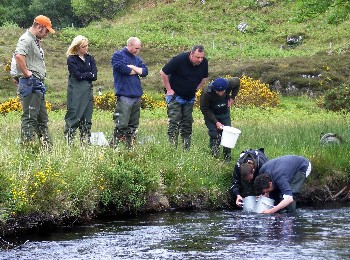Freshwater mussel survey training course for Trust biologists
Posted: Friday 18 June, 2010 @ 16:17:56

On 17th June, the Wester Ross Fisheries Trust hosted a training course for fisheries trust biologists to learn protocols for Freshwater Pearl Mussel surveying. The Freshwater Pearl Mussel Margaritifera margaritifera was once abundant in Scotland. However, as a result of pollution and over-fishing mainly last century, populations were lost from many rivers in the country. There are now very few FWP mussel populations where young are still being produced. Indeed, across Europe very few viable FWP mussel populations remain. Many FWPM populations in Wester Ross have been almost wiped out as a result of overfishing.
The freshwater pearl mussel life-cycle is such that mussel larvae, called glochidia, require a trout or salmon host upon which to attach after being expelled by the female mussel. Glochidia attach to the gills of trout or salmon fry in July each year, and remain on the fish until early spring. The relationship with salmon and trout is thought to be symbiotic: by flitering river water and providing habitat for insect larvae, mussels provide good conditions for juvenile salmon growth. WRFT electro-fishing surveys suggest that rivers with healthy FWPM populations usually support high densities of juvenile salmon. The healthiest FWPM river, the Varzuga River in Russia is also one of the most productive Atlantic salmon rivers in the world.
Freshwater pearl mussels are very slow growing, often taking 12+ years to mature and living for 100+ years. It is now illegal to fish freshwater pearl mussels and remove to FWPMs from the water. Only two jewelers in Scotland are now licencesd to trade in pearls from freshwater mussels. With cultured pearls now costing only 30p, you would have to be mad to detroy an ancient bed of freshwater mussels for the 1 in ~1000 chance of a finding a half-decent pearl worth next to nothing.
The training course was provided by Dr Iain Sime of Scottish Natural Heritage and attended by biologists from other trusts in the north of Scotland. Further information about freshwater pearl mussels can be found on the SNH website, by clicking here, including a series of documents relating to the species ecology and survey techniques.
Thank you to Iain and to SNH for providing an excellent training course. Our challenge is to restore healthy mussel populations and healthy fish populations in Wester Ross rivers: the two go together!